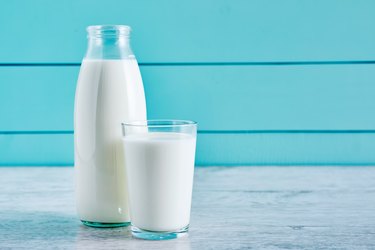
Milk is good for your bones, but it may not be good for your blood iron levels. Certain proteins and the calcium in milk and iron interact, making it harder for your body to absorb iron. Drinking milk with dinner or other meals may be a bad idea if your iron levels are low.
Tip
Drinking milk with meals can inhibit iron absorption and contribute to decreased blood iron levels.
Video of the Day
Dairy and Iron Absorption
Some foods and nutrients can enhance iron absorption, while others inhibit it. According to a review published in the Journal of Research in Medical Sciences in February 2014, dairy is an inhibitor of iron absorption.
Video of the Day
Both the mineral calcium and the proteins casein and whey — found in large amounts in milk and other dairy — block iron receptors, reducing the amount of the mineral the body is able to absorb from iron-rich foods. This is true regardless of the source of the iron or type of iron. The absorption of both the non-heme iron in plant foods and the heme iron in animal foods is affected.
One cup of milk contains 8 grams of protein, per USDA FoodData Central data. Approximately 80 percent of this protein is casein and the other 20 percent is whey, reports a review article published in the Iranian Journal of Pharmaceutical Research in summer 2016.
Milk also contains 300 milligrams of calcium per cup. According to the Journal of Research in Medical Sciences review, research shows that there is a dose-respondent relationship of dairy and iron absorption, with inhibitory effects observed at doses of 165 milligrams of calcium from milk products.
Read more: Should I Cut Dairy Out of My Diet?
Maintaining Your Iron Stores
Iron is essential for transporting oxygen throughout your body and for supporting your metabolism and healthy connective tissue. It's also important for growth and development, neurological development, hormone synthesis and cellular functioning. Symptoms of iron deficiency include fatigue weakness, difficulty concentrating, impaired cognitive functioning, poor exercise and work performance and impaired regulation of body temperature.
According to the National Institutes of Health, iron deficiency is not uncommon in the U.S., so it's important to keep a close eye on your iron intake. However, certain populations are especially at risk, including pregnant women, infants and young children, women with heavy menstrual bleeding, people with gastrointestinal disorders or who have had GI surgery, people with cancer and frequent blood donors.
These people should be especially careful about avoiding eating or drinking foods and beverages that decrease iron absorption. In addition to the calcium and proteins in milk and dairy, phytate and polyphenols are known inhibitors. Both are found in plant foods, such as cereals and legumes, while polyphenols are also found in some fruits and vegetables, coffee, tea and wine, according to the Journal of Research in Medical Sciences review.
Some substances in foods also act as facilitators for iron absorption, which can help counteract the inhibitors. These include vitamin C, citrate and some amino acids. Eating these foods or foods containing these substances could help counteract milk's effects, although it is dose-dependent and based on a ratio that varies widely. Your best bet is to avoid drinking milk with dinner and other meals if you are worried about your iron levels.
Additionally, if your doctor has advised you to take an iron supplement, be sure not to take it with milk. Plain water is best.
Was this article helpful?
150 Characters Max
0/150
Thank you for sharing!
Thank you for your feedback!